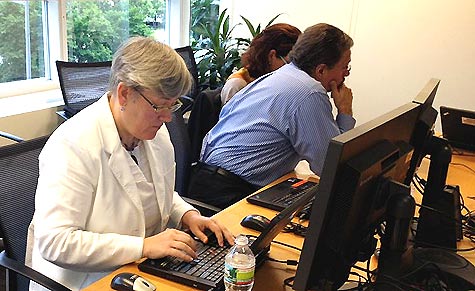
I enjoyed talking with everyone who signed into the live chat this week. If you missed it, you can catch up with the conversation at World Bank Live.
We talked a lot about the importance of moving beyond GDP to a more holistic way of measuring development that incorporates the value of natural resources. We also discussed inclusive green growth as the path to sustainable development, the need for better oceans management, expectations for Rio +20 – the UN Conference on Sustainable Development – and what people want to see in any sustainable development goals (SDGs) that emerge from the conference.
The hour flew by, and there were several questions that I didn’t have time to get to. I’d like to address some of those now.
The Growing Garbage Problem
During the chat, Ankit Khandelwal asked about how to curb the all the waste being produced, and I said we had a report coming out the next day. That’s online now, and I recommend reading it. The report describes how today's municipal solid waste – about 1.3 billion tonnes a year – is expected to increase to at least 2.2 billion tonnes by 2025, with city budgets for dealing with it also going up, from $205 billion today to at least $375 billion in the next 12 years. Some cities will likely need a five-fold budget increase, and they already face enormous challenges meeting today's demands.
Consumption Patterns
In a similar vein, Marcos Méndez Sanguos of Spain asked if OECD countries would have to decrease their level of consumption. The way we see it, the real issue is not so much about consuming less as consuming differently – being more efficient with resources so there is less waste and improving consumption patterns. Growth is still essential to raise millions out of poverty.
Resilient Communities
Tarequl Islam Munna of Bangladesh asked about the role for South Asia. The World Bank’s new environment strategy, which we just released this week, focuses on better management of natural resources, reducing pollution and building resilient communities. Every community will do this differently. In much of South Asia, creating resilient communities for everyone is especially important with climate change. Keeping eco-systems healthy, such as mangroves that serve as natural storm buffers, plays a vital role.
Landscapes – Agriculture, Forests, Water
Something else we've been talking about is the inextricable link between agriculture, forests, water, and food security. We can’t achieve global food security without preserving the ecosystem services that forests provide, and we can’t sustain forests without thinking of how we will feed a growing population. And we can’t grow food without enough water. It’s all connected.
The World Bank Group is increasingly using landscape approaches, which integrate management of land, water, and living resources, and that equitably promote sustainable use and conservation. For example, On Colombian hillsides, the landscape approach is integrating livestock, trees and a range of crops, depending on the slope of the land and the direction of the streams, to increase incomes while conserving the landscape.
How to Motivate Action
I also appreciated all the questions about how to motivate people and help them understand the urgency of getting to sustainable development.
We have hope for the Rio negotiations, but no matter what happens there, the world has to move forward on action at every level. You’ll find cities that are already leading the way with smart public transportation, policies requiring energy efficient buildings, and new ways to cut greenhouse gas emissions.
By providing more holistic data and evidence – the way natural capital accounting does – we can begin to persuade countries and companies that sustainable development really is in their best interest, and that failing to grow sustainably will cost them in the long run, if not destroy them. Increasingly, we are seeing the private sector recognize the value of not pushing natural resources beyond their capacity – that understanding comes from the data and the evidence.
Rachel Kyte
Vice President for Sustainable Development
www.worldbank.org/sustainabledevelopment
Twitter: @rkyte365


Join the Conversation